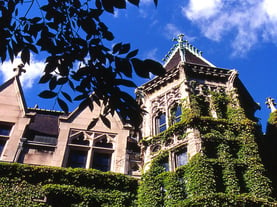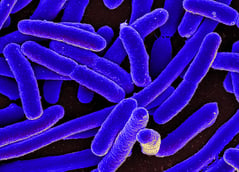The University of Chicago is receiving $100 million from Craig Duchossois, his wife, and Janet Duchossois and The Duchossois Family Foundation. The funding will be used to establish a new life science institute that will focus on the development of a “new science of wellness.” As the name indicates, The Duchossois Family Institute: Harnessing the Microbiome and Immunity for Human Health, will work to accelerate research and interventions based on how the human immune system, microbiome and genetics interact to maintain health.
Read MoreTags: Midwest, microbiome, immunotherapy, University of Chicago, BioResearch Product Faire Event, Chicago, Front Line event, laboratory equipment, lab suppliers, UChicago, BioResearch Product Faire, microbiome immunotherapy
 Researchers around the world are constantly studying ways to create new treatment methods to fight cancer. With so many different forms of cancer, using one treatment method is not always effective for everyone battling this disease. Recently, a team of scientists in Chicago teamed up to create a new treatment method. Researchers from the University of Chicago and the biotechnology company Evelo Biosciences have partnered to develop a new microbiome-based immunotherapy treatment method for fighting cancer.
Researchers around the world are constantly studying ways to create new treatment methods to fight cancer. With so many different forms of cancer, using one treatment method is not always effective for everyone battling this disease. Recently, a team of scientists in Chicago teamed up to create a new treatment method. Researchers from the University of Chicago and the biotechnology company Evelo Biosciences have partnered to develop a new microbiome-based immunotherapy treatment method for fighting cancer.
Tags: Midwest, microbiome, immunotherapy, University of Chicago, cancer research, Chicago, Front Line event, IL, UChicago, 2016, BioResearch Product Faire, cancer therapy, Evelo Biosciences, microbiome immunotherapy
 The human microbiome is a complex system of bacteria that live and interact in different tissues and organs throughout the body. This complex system is a growing area of focus for life science researchers looking to learn more about these interactions and functions. In order to help its researchers in this rapidly expanding field, Columbia University in New York has established both a working group and a new core facility to help increase research potential of the microbiome.
The human microbiome is a complex system of bacteria that live and interact in different tissues and organs throughout the body. This complex system is a growing area of focus for life science researchers looking to learn more about these interactions and functions. In order to help its researchers in this rapidly expanding field, Columbia University in New York has established both a working group and a new core facility to help increase research potential of the microbiome.
Tags: Northeast, microbiome, New York, Columbia University, Columbia, Research, NY, Columbia University Medical Center, 2016, BioResearch Product Faire, CUMC
Remember the character of Pigpen in the comic strip Peanuts? He walked around within a cloud of dust and dirt. Well, according to University of California Davis microbiologist Jonathan Eisen, we all live within our own aura of microbes --10 times as many microbial cells as human cells!--and that's probably a very good thing for our health. It sounds counterintuitive at first, but not all microbes are bad. We've come to realize intestinal biota are good for digestion and colon health (among other things), but the outside of our bodies is also host to vast colonies of microbes that are increasingly proving to be vital cohorts of our immune system.
Tags: University of California Davis, microbiome, DNA Sequencing, genomic research, California, 2012, BioResearch Product Faire Event, UCSD, Sacramento Campus, TED
 We're finding out that there's a lot more to malnutrition among infants and children than just not getting enough to eat, or enough high-quality food. Individuals may develop malnutrition as a result of what is or isn't growing in their gut, where food gets processed. It's a fascinating insight with significant implications for treating a deadly world problem. In addition to getting sufficient good food, malnutrition could be addressed with novel dietary and microbial therapeutics, effectively optimizing a person's ability to draw nutrients and calories from the food and drink they take in, as well as making sure the immune system is being supported rather than compromised in the process.
We're finding out that there's a lot more to malnutrition among infants and children than just not getting enough to eat, or enough high-quality food. Individuals may develop malnutrition as a result of what is or isn't growing in their gut, where food gets processed. It's a fascinating insight with significant implications for treating a deadly world problem. In addition to getting sufficient good food, malnutrition could be addressed with novel dietary and microbial therapeutics, effectively optimizing a person's ability to draw nutrients and calories from the food and drink they take in, as well as making sure the immune system is being supported rather than compromised in the process.
Tags: CA, Bioscience research, Midwest, Washington University, WashU, University of Colorado, microbiome, The Bill and Melinda Gates Foundation, Northwest, Biofrontiers Institute, Southwest, UCDMC, BioResearch Product Faire Event, Funding, Genomics, CO, St Louis, Sacramento, Boulder, UCO, UC Davis
If you're in a modern building with an HVAC system, you probably think of it as a controlled environment: air, relatively clean, either warm or cold depending on the setting, is pumped in for your respiratory benefit. Yet hospitals and schools are some of the worst places to go if you don't want to get sick, even if you never touch a single surface. That's because the air is full of trillions of microbes, and buildings (any buildings) host their own complex ecosystems which we're just now starting to study. Researchers in this relatively new field include biologists as well as architects who are working together to understand the "built environment microbiome." The University of Oregon's BIOBE Center (Biology and the Built Environment) is a hub for this research into what makes a building good for human health, or not.
Tags: microbiome, UOr, Northwest, women in science, University of Oregon, Ecology, green life science research

